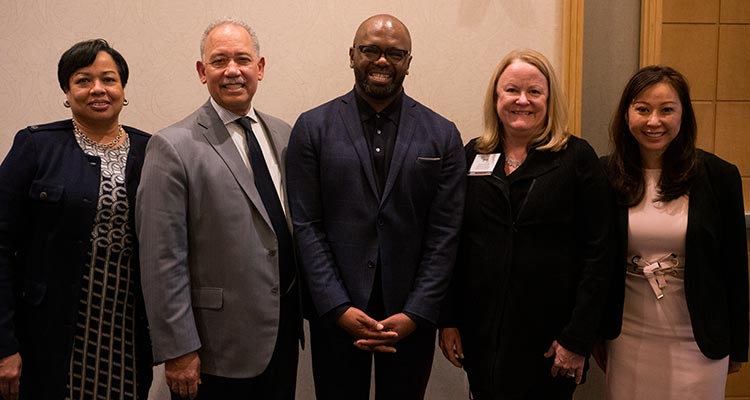Scalia Law’s Corley Institute for Diversity & Inclusion Education Hosts Inaugural Conference

George Mason University’s Antonin Scalia Law School launched The Corley Institute for Diversity & Inclusion Education with an inaugural conference, November 4-6 in Arlington, Virginia. The Institute brought representatives from fifty law school together with thought-leaders from law firms and Fortune 100 companies to discuss diversity and inclusion programming for law students.
Kelly McNamara Corley, for whom the Institute is named, is Executive Vice President, General Counsel and Secretary of Discover Financial Services. Ms. Corley, a graduate of the law school and trailblazer in diversity and inclusion, opened the conference with a keynote address on the “Market Case for Diversity and Inclusion Initiatives.” She feels so strongly about the need for diversity and inclusion as a business proposition that she now includes questions related to diversity and inclusion in the interviewing process for her company’s legal department. Discover grades law firms hired to represent them according to the firm’s commitment to diversity and inclusion. “We put pressure on our law firm partners to be innovative in diversity and inclusion,” she said.
Following Ms. Corley’s Keynote address, Annamaria Nields, Associate Dean for Administration and Student Affairs, led a panel discussion on the Diversity & Inclusion Certificate Program Scalia Law rolled out last year. A speaker in that program, Ms. Corley noted that, “Students (with) skills in this area can add value quickly in a business setting or legal setting.”
At lunch, the participants heard from Joseph K. West, Partner and Chief Diversity Officer, at Duane Morris LLP. Mr. West said there is a demand for fluency in the language of diversity and inclusion in law firms. “Diversity and inclusion are important to the bottom line,” he said.
Diversity, West explained, speaks to the work force, while inclusion speaks to the work place. “This is not about social engineering or political correctness; this is about business.”
Later that day, attendees heard from two panels. The first panel, entitled “The Corporate Client’s Perspective,” included Bruce Jackson, Lead Counsel, U.S. Commercial Enterprise Group, at Microsoft; Brenda Morris, Deputy General Counsel for Booz Allen Hamilton; Thomas L. Sager, a Partner at Ballard Spahr LLP (formerly General Counsel and Senior Vice President for DuPont); and Sherry D. Williams, Vice President, Deputy General Counsel and Global Chief Ethics & Compliance Officer for Jabil Circuits, Inc.
Mr. Sager explained how the CEO of DuPont, an early proponent of diversity and inclusion, “mandated his team to see through the lens of women of color… ask ‘how do we connect?’” Mr. Jackson noted, “at first it was the right thing to do, then it became a business imperative.”
“That’s why we need a program [Diversity & Inclusion Training] like this,” according to Ms. Williams. “If we can catch students early and educate them…we will give them a head start.”
The other panel, entitled “Law Firm Perspectives,” included Cyndie M. Chang, Managing Partner for Duane Morris LLP in Los Angeles; Stephanie Scharf, Partner of Scharf Banks Marmor, a women-owned firm, and Chair of the ABA Commission on Women in the Profession; Grace E. Speights, Partner with Morgan, Lewis & Brockius; and Benjamin F. Wilson, Chairman of Beveridge & Diamond.
The panelists discussed retention and partnership opportunities for diverse attorneys, implementation of the “Mansfield Rule” by large law firms, and the importance of law schools teaching students to obtain and grow mentors and sponsors, network in meaningful and sustainable ways, and pitch their skills. They encouraged law schools to train their students to understand unconscious bias, “building it into their thought process.”
For the remainder of the conference, attendees participated in Diversity & Inclusion (D&I) exercises that can be used with students, and brainstormed next steps for D&I in legal education.
According to Senior Associate Dean Alison Price, “The conference provided a dynamic launch to Scalia Law’s Corley Institute on Diversity & Inclusion Education. We sought out leaders who have seen diversity and inclusion in practice, whose bottom lines have benefitted as a result, and who were willing to talk to law schools about their experiences, expectations, and needs,” she said. “We want our students to be fully prepared to enter the workforce of the future.”
The Institute hopes to serve a national catalyst for diversity and inclusion programs that educate law students, legal educators, and practitioners about the positive social, economic, and moral impact of diversity and inclusion.